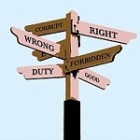From Politics Beyond Liberalism, the Political Theory of PROUT by Ac. Krtashivananda Avt.
 Because so many laws are framed according to the interests of the ruling class and not the interests of society at large, a deeper basis for law must be sought in cardinal, or perennial, moral values. To repeat, morality should not be confused with religious ethics. Moral concepts have a universal dimension and are evolved from the psycho-spiritual stratum. According to Sarkar, morality is not just a set of do’s and don’t’s imposed on people by some centralized agency, but is part of a spiritual urge to discover oneself.
Because so many laws are framed according to the interests of the ruling class and not the interests of society at large, a deeper basis for law must be sought in cardinal, or perennial, moral values. To repeat, morality should not be confused with religious ethics. Moral concepts have a universal dimension and are evolved from the psycho-spiritual stratum. According to Sarkar, morality is not just a set of do’s and don’t’s imposed on people by some centralized agency, but is part of a spiritual urge to discover oneself.
Political philosophy should be considered to be an application of a moral philosophy based on cardinal values whose genesis is beyond the bounds of time, place and person. However, morality is not the goal, but the base of human expression. It is a dynamic force, and adherence to that force enables human beings to reach the status of the Supreme Self, the Supreme Knowledge. Morality is not the dreamy fantasy of the idealist, nor is it the means to an end of the materialist. It is a physico-psycho-spiritual approach to reveal wisdom and realize the spirit of unity in the diversity of creation. It is a force for the progressive march from imperfection to perfection.
Sarkar recommends the following values for all societies as moral values:
- Non-violence. One should not hurt anybody with a vengeance directly or indirectly – physically or mentally. Both overt and covert violence should be prohibited.
- Truthfulness in words and actions. In the true sense of the term, one’s words and actions should not be detrimental to the collective interest. One should not be hypocritical.
- Non-stealing. In the broader perspective, this means not to deprive others of their legitimate rights.
- No misuse of wealth either natural or man-made.
- A universal attitude. All living beings are manifestations of the Supreme Consciousness.
- Our welfare is entwined together.
Based on the above cardinal principles, one universal law, one universal penal code for the universal human being is the demand of the day. While framing laws, all considerations of narrow sentiments based on religion, race, nation, caste or community should be discarded. When there are conflicts between criminal law and moral law, the latter should be respected.
Copyright The author 2011
